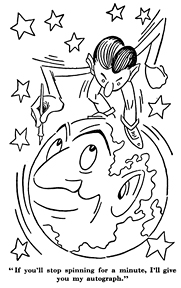Here’s the sixth installment in our look at Manners for Moderns, a 1938 etiquette guide for young men.
VI
PERSONAL PUBLICITY
| “The time has come,” the Walrus said, “To talk of many things.” |
| —LEWIS CARROLL |
Whenever a person (or a business concern) wants to have himself brought to the attention of the public, he hires a “publicity agent.” The agent will arrange for pictures and stories in the newspapers, interviews in magazines, public appearances, radio speeches, and whatever else he can think of to arouse public interest in his employer. Every stage and movie star has a publicity agent, and even as large a concern as the Standard Oil Company has employed a “public-relations specialist.” The real job of the publicity agent is to make the public like and sympathize with his client. He tries to make him (or her) popular with everyone.
| Being Your Own Publicity Agent |
At first thought it may seem that an ordinary individual (who has no ambition to be a movie star) would have no need of a publicity agent. But upon further thought it would appear that any of us might need such an agent far more than someone who is already rich and successful. For what we all have to do is to sell ourselves to the world around us,–make ourselves popular with our friends, our employers, and associates. If we don’t succeed, we are going to be failures in all the things we attempt. What are we going to do about it (since we can’t afford to hire someone to make us popular)? There’s just one answer: Each of us must be his own publicity agent.
| How Often Clothes Make the Man! |
First of all, let’s review the things which advertise to the world what sort of man one is. Probably the first thing which strangers notice about an individual is how he dresses. This doesn’t mean whether or not he wears expensive clothes but how well chosen they are, how clean, how neat, how suitable for the occasion. So watch your clothes. Keep them clean, well pressed, and well brushed. Arrange the things you carry in your pockets so that they won’t bulge and spoil the lines of your suit.
Be careful about the ties you choose. It’s far better to wear one that’s dark and conservative than to splash out in one of such violent colors that it stuns the beholder. The same idea holds for the practice of stringing a watch chain across your front loaded with a lot of glittering jewelry. You want people to notice you as a person, not as a signboard. So keep the trinkets, charms, fobs, and pins out of sight.
Choose your shirts with the same care you do a suit. If you operate on a limited budget, you’ll find plain white or blue shirts the best investment. A white shirt is correct for every occasion, looks well with suit or tie of any hue, and is more becoming to every complexion than a colored one.
Don’t buy white-flannel trousers unless you’re sure you can afford to keep them spotless and pressed. Nothing looks quite as sad as slightly mussed and soiled white trousers.
Keep your dark shoes shining and your white shoes white. Two minutes a day and a generous amount of elbow grease will do this perfectly. Shoes are tremendously important in advertising personal pride. If you can’t afford shoetrees, you can stuff paper in the shoes when you aren’t using a pair. That will help them keep their shape. Have run-over heels repaired at once.
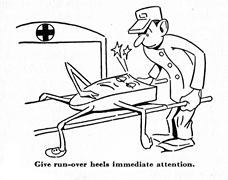
Once a business executive who employed hundreds of men said to us: “Whenever a man comes to me for a job, I look first at his shoes and hat. If he keeps them looking neat, I know he’ll attend to small details on the job efficiently.”
Don’t forget that! The difference between looking neat and looking sloppy is attention to small details of dress.
Being careful about your clothes will help you along with the girls, too. Every girl knows that a man who is proud of his appearance will appreciate the primping she does for him. Keep your clothes in good shape all the time and never appear in public unless you are looking your best. It’s a fatal mistake to spend most of your days in public in careless disregard of your clothes and then appear at parties “all dressed up.” Its always shows, because you can’t help being self-conscious about your appearance.
Keep away from fads in clothes unless you can afford a huge wardrobe. One good dark-colored shirt will last you much longer and be more useful for many occasions than will a couple of suits too light in color or too “sporty.” Wear a hat that looks as though there’s some spice in life. Don’t wear one that looks as thought it had weather a dozen cloudbursts and was sick and tired of the whole business.
Suspenders are a big help in keeping the crease in trousers. But, for goodness’ sake, don’t wear them without a coat and don’t buy such loud ones that they shriek to high heaven.
Wear garters. They help in the neatness campaign and they are flattering, for they make your ankles look smoother than drooping socks will ever do.
Neatness about your person counts as much as neatness in clothes. Keep your nails shorts and clean, but not polished. Keep your hair clean, cut, well-brushed, and well-combed. Don’t plaster a lot of smelly, sticky paste on it. It will have more appeal for the ladies if you leave it as nature intended. There’s nothing very romantic about running one’s fingers through a field of grease. If you are bothered by a thatch of wild hair, perhaps your barber can arrange a haircut that will tame it. Keep your face looking clean and smooth-shaven.

Never, never, never appear in public looking as though you’d forgotten what a razor is intended for.
Take plenty of baths. As often as necessary, particularly after hard work or a dusty ride, make the bath a real bath for the whole body, not just a once over for the high spots. At least one bath a day is a habit that’s taken for granted by men who know their way around. Use the soap enthusiastically and scrub thoroughly. The fresh-bathed look is appealing to everyone.
Right here we’d like to mention a little matter that is overlooked by a lot of men. Maybe you’ve thought it was a joke. Some people do. But most people, including girls who do much dancing, don’t think so. It is the matter of deodorants. There are inexpensive ones at your drugstore, and plenty of regular he-men use them. It’s a mighty good idea to get into the habit of using one all the time. You want to smell clean as well as look clean. Please, don’t forget this little habit. Girls notice all these things; so do employers.
Keep your teeth shining and fresh. This will be easy enough if you brush them a couple of times daily, use a mouthwash before going out, and see your dentist when you should.
Next to appearance your manners are your best personal advertising. We’ve been doing a lot of talking about etiquette. We hope you’ve already begun to use it and will keep on using it every moment of your life. Practice it all the time, for if you don’t you may some day make a mistake you will regret forever.
| Society is Not Fond of Chiselers. |
Many young men, without realizing it, pick up extremely bad manners,–habits which can end by making them unpopular with everyone and total failures in the world. Take the matter of “chiseling in” on parties or dates. How do you feel about the fellow who tries to sponge or get out of paying his own way? You don’t ask him out very often, do you?
What is chiseling, anyway, but just another word for stealing? Be sure you always pay your own way. If another fellow insists on treating you, that’s all right. But, be certain it’s understood before you begin the evening. It’s better to put the matter on a Dutch-treat basis when you can, for then you’re sure no one is going to think you’re a sponge.
Pay your own way in everything. Smoke your own cigarettes, eat your own fruit and candy, get your own girl, drive your own car, use your own camera, spend your own money. When you borrow anything, be prompt about returning it and be sure it’s in good condition when you give it back. Don’t be a “moocher.” If you must sometimes borrow, be sure to return value received. Be gentle with the books you borrow. Return them promptly. Don’t break their backs, write on the pages, set wet glasses on the covers, or drop food between the pages. Don’t borrow money unless you’re sure you can pay it back very soon. Don’t pester friends for favors. We repeat: Pay your own way in everything. The fellow who doesn’t is little better than a thief.
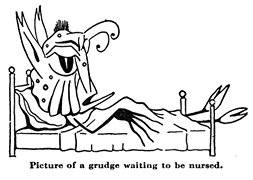
Fighting is far beneath the dignity of a gentleman. Seems a pity even to have to mention the word. However,a hot-tempered young man sometimes finds himself involved in a fight which has sprung up over some trivial misunderstanding. Don’t allow yourself to get into any sort of fight, whether with firsts or words. Instead, when you find yourself dangerously close to the fighting stage, get some disinterested third person to act as referee. Put the matter up to him and let him decide. Then take his decision with a smile. Keep your temper and don’t be bashful about apologizing when you are wrong. A cheerful apology is the sign of a man with a big personality. A grudge nursed and whined over is the sign of a mean, disagreeable, small person. Fighting of any sort is the very worst personal advertising one can give himself. To get along in the world, to be popular, one has to be able to get along with other people.
A short outline for the personal publicity campaign:
| 1. Keep your clothes clean and neat. Remember that your dress advertises your taste. |
| 2. Cultivate habits of personal cleanliness. |
| 3. Beware of being a chiseler. Pay your own way. |
| 4. Keep out of fights. Apologize when you are wrong. |
| 5. Learn the rules of etiquette and use them all the time. |
| Tattling and Gossiping Are Taboo. |
Nothing will make you so generally disliked as being a “tattletale.” Nothing could be higher praise than to have it said of you, “He doesn’t talk about anyone.” Knowing when to keep one’s mouth shut and when to open it is a fine art which all of us would do well to practice more.
| A wise old owl sat in an oak, |
| The more he saw the less he spoke |
| The less he spoke, the more he heard. |
| Why can’t we all be like that bird? |
There is a difference between tattling and giving evidence requested by those who may have the right to know the facts of the case.
A “tattler” is a person who goes around telling everything he knows about other people. Sometimes he does it just because it makes him feel important, and sometimes he does it because he gets a kick out of seeing others in trouble.
In either case, you can write it down that the “tattler” is a person who has no respect for, or confidence in, himself. He has a sneaking hunch that he is an insignficant, mean, unpopular, little human being, and he can’t bear the thought that other men may be better than he is. So instead of spending his time and energy developing good personal pubicity for himself, he spends all his days trying to put out bad publicity about someone else.
Evidence-bearing is similar to be called as a witness in court. There you have to swear to “tell the truth, the whole truth, and nothing but the truth.” When you are called on to give evidence, you must decide how much right the authorities have to ask it of you. If you believe they have every right, you may give your evidence with the knowledge that it is your duty and that you could not honorably refuse. If information should come to you of some future trouble to a friend or those in authority, and you know that you could prevent it by repeating the information, you should, by all means, tell what you know to the proper person.
A gentleman does not lie, either about himself or another person. If he cannot speak out truthfully, he keeps his mouth shut. It is far smarter to acquire a reputation of knowing a lot but saying little than to acquire one of spilling everything into the ears of the world. a reputation of the latter sort will mean that before long such a person will have nothing told to him. He will be left out of everything interesting and have no real friends. That is what happens to liars. They are found out sooner or later and laughed at behind their backs.
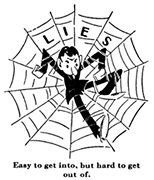
Gossip comes pretty close to the classification of “lying.” A good deal of gossip is exaggerated. Much of it is based on what someone thinks or some rumor which may not have a bit of truth in it. If some bit of gossip reaches your ears which can’t be proved, you have good grounds for suspecting that it may be a lie.
Maybe you have played the game called “Gossip.” It is a good illustration of how one simple statement can grow into something entirely different after it has been repeated several times. The game is played in a circle of several people. The leader whispers something into the ear of his right-hand neighbor. That person repeats the statement to his neighbor, and so on around the circle. At the end, the leader tells what the original statement was and the way it came back to him. If you have never thought about the harm that gossip may do, you should try playing this game with a group of your friends. It will open your eyes!
Whenever anyone says a bit of gossip to you, ask yourself: “Am I going to do myself or the other party any good by repeating this?” If you can truthfully answer “yes,” then you may feel that the “bit” is not gossip but information.
Break yourself of the gossip habit. It will never make you friends and may you the loss of friends and employment. How would you like to feel that people you know are repeating gossip about you?
| Modesty Is a Virtue. |
Bragging is simply “kiddish showing off.” If you are really a big shot, your reputation will speak for itself.
“Actions speak louder than words.” The fellow who does a lot of bragging is the one who doesn’t amount to much and knows it. He has to “toot his own horn” because he’s so afraid no one else will toot it for him.
The really big men are always modest about what they have done or can do. This is so true that it is often said that modesty is a sign of greatness.
Colonel Lindbergh is a fine example of modesty. How many of you know that he is doing really important scientific work in addition to flying?
Just remember the next time you hear someone bragging for all he’s worth, that the stuff he’s shooting off is only stuff he’d like to do, if he could. Down in his heart he knows he’s not so hot!
Keep yourself inconspicuous. You don’t have to make a loud noise in public to prove you’re there. Loud talking, laughing, shouting, showing off, are the marks of a small-town smart-aleck. You’ll never be popular by trying to prove you have a louder voice than the rest of the world. Being loud may be advertising, but it isn’t the sort of advertising that’s going to make anyone want to “buy stock in you.”
| A Good Telephone Manner Is an Asset. |
It’s awfully easy to give ourself a bad reputation through your telephone conversations. Keep them short and sweet. Be courteous and speak in a quiet voice. Don’t hang on and on to the phone until your audience wishes you’d drop dead of heart failure. Deliver your message and hang up. When taking a message, take pains to get it right, just as you’d like someone to attend to a message for you. Don’t talk so long you get “talked out” and then flounder around while fishing for more to say. A good telephone manner is a valuable asset. Practice it. You may need it in business some day.
| Beware of Making Libelous Statements. |
Follow the same suggestions when writing letters. Remember that letters are often saved, and things put down in black ink may be embarrassing to read on a later day. Never say anything against anyone in a letter. It’s dangerous and may be brought up to you at any time.
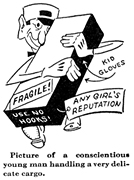
You may feel that you simply can’t get along in this life unless you keep a complete notebook no all the young ladies you know. We think it’s a bad practice, but we suppose some of you will do it. However, you’d better be careful about the person you let see it. A girl’s reputation is a more delicate thing than a Christmas tree ornament, and a young man of sense will handle it as delicately as he would a rare jewel. He will keep his mouth absolutely shut on the subject of the girls he knows. If anyone else wants to find out what sort of girls they are, let him find out for himself.
A gentleman never takls about a woman in any but the kindest way. It’s better not to keep notebook on your girls. Then you won’t be tempted to show it. And it’s better not to talk about them. Then the girls won’t be stung into saying mean things about you to “get even.”
| A Snob Is Never Really Like. |
What’s your private opinion of a chap who tries to prove he’s better than his fellows by being a snob? Pretty low sort of animal, isn’t he? The snob is afflicted with such a bad case of nearsightedness that event he end of his nose looks dim. He doesn’t know that being a snob is only advertising that he is ashamed of his background and has no confidence in himself. The man sure of himself isn’t afraid to be friends with all the world, high or low. In the end, a snob is bound to be found out and then he becomes nothing more than a slightly silly punctured balloon to everyone he has known.
Honesty is the best policy when you start out to sell your personal advertising to the world. Then you won’t be receiving notices that you misrepresented the thing you’re selling. Suppose some silly snob has decided to snub you? How are you going to behave? Think about it for a second before you lose your temper. What was the reason for the snub? Just to get a rise out of you, wasn’t it? Then don’t give the snubber the satisfaction of knowing he has succeeded. Act as though you hadn’t noticed anything. Continue to behave as though nothing out of the way had happened. Be absolutely indifferent to any attempt at snubbing you. Grin back at the party. You’ll make him furious but he won’t be able to do anything about it without making a fool of himself. The victory will be yours, both in the eyes of the world and in that secret part of yourself where you cultivate your personal pride. It’s a grand feeling to know that you’re too big to be bothered by such tiny trifles.
Don’t roget the little poem about the “Honorable Owl.” It’s a good idea to memorize it and say it over to yourself when you feel that you may be slipping on some of the points we have mentioned.
An outline for the second part of your publicity campaign:
| 1. Don’t be a “tattler,” a liar, or a gossip. |
| 2. Keep a tight rein on your tongue when you feel the impulse to brag. |
| 3. Be inconspicuous in public. |
| 4. Keep all letters and telephone conversations short and sweet. |
| 5. Handle a girl’s reputation with care. |
| 6. Don’t be a snob. |
| 7. Ignore a snub. Don’t let weak bullets dent the armor of your self-control. |
| Manners in Business |
Do you remember in the first chapter of this book we spoke of the factors which go farthest toward success in the business world? As against fifteen per cent of technical training the cards stacked eighty-five per cent of personal characteristics. Now, here is where you are really going to cash in on your personal advertising campaign.
What to do before you apply for a job? You want to realize before you ever start out just what you are giong to offer the prospective employer. You’re really a salesman out to sell yourself. We’ll suppose that you have practiced the parts of your advertising campaign so thoroughly that you will automatically appear well-dressed, clean, neat, and well-mannered. If you do that, you’ll win the first test.
Next, you must map out a plan to capture the interest of the interviewer. You should make a list of your experiences, your training, your ambitions, and what you know you can do. Have a good answer to the question “Why do you want this job?” Be courteous in your replies. Put a “sir” in your answers. Stand up straight! Don’t slouch against the desk. Let the interview do most of the talking, but when he gives you a chance, make it short and to the point. Tell him why you’d like to work in that organization and why you think you’re fitted for the job. Don’t talk too much! Talking oneself out of a job is a common fault. Show that you know something about the business, that you’re interested in it and not just in the pay check. Be as confident as you can but don’t be cocky. Ask sensible questions that prove your interest. Asking how much salary you’ll get, what hours you’ll have to work, how much vacation will be given are very poor sales points. The employer wants to feel that you’re so interested in the job you will have to be chased home at night.
Once you’ve landed the job you must exert yourself if you wish to keep it. You must continue to look well-dressed and careful of your appearence if you work in a place where such is obviously expected. If you are working at something which means getting your hands or your clothes dirty, you must learn to feel that the job comes first.
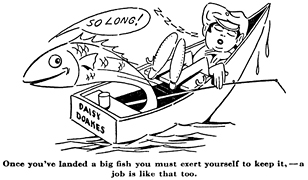
Manners in business must be pleasant, friendly, and dignified. You must learn to keep cheerful, to smile over everything, even slights and disappointments, to do your share of the work, and to be above helping someone else; to do your own job as perfectly as you can and show confidence in yourself and your employer. You must learn not to boss people who are under you and not to be too spineless before people who are over you. You must always keep your temper and avoid any sarcastic remarks or horseplay. You must be as courteous to the janitor as to the president. You must be loyal to your associates and your firm, and you must learn never to discuss business details or gossip with anyone either in the firm or on the outside.
In business, the “man who gets things done” is marked for promotion, while the “clock watcher” is the first man let out when the force is reduced. To have good business manners means that you will try to learn everything you can about your firm; that you will give value for the check you receive; that you will try to supply ideas to bring profits to the firm; that you will try to make every effort to prepare for a bigger job; that you will get along to the best of your ability with your fellow workers.
Remember, “one is never too old to learn” Take suggestions and hints gracefully. Listen to those who have had experience and learn what you can from them.
Don’t be too friendly with your business associates. Keep your personal affairs and troubles to yourself. You are using the boss’s time when you talk about yourself during work hours.
Don’t have your friends telephone while you are at work and don’t use the office telephone for personal phone calls.
Don’t be an “alibi artist.” You must learn to accept the consequences of your own mistakes. Don’t mix into things which don’t concern you. In business you must learn to “take it” with a smile.
Be very careful in your choice of associates. “A man is known by the company he keeps” is a very old, but very true saying. It is better not to associate too closely with people who work for the same company as you. Unfortunately, in the business world, friends may turn into enemies over night when a new job prospect opens. Some of the confidences you gave to a supposed friend may be held up as proof that you gossip. It is easy to be friendly but dignified and to win the respect and liking of your associates and superiors. Choose as friends those men whom you respect and admire the most. In time you will find yourself growing like them.
Never forget that for everyone life has countless possibilities for choice. Out of these you must choose your own course of conduct. It is up to you to make yourself liked, useful, generous, happy, successful, or whatever you will. No one can do it for you, but you can learn from what others have done. Self-control does not mean that you are a hypocrite, that you are not “being yourself.” How well do you think you would get along in school if you threw yourself on the floor to kick and scream like a baby when your teacher finds it necessary to correct you? Do you think you’ll get along very fast or far in business if you do that when things don’t go your way?
Manners make the key which open doors for you, but it is up to you to put that key in the lock. That is why it is said that manners are “good” when they fit the surroundings. In business you may “be yourself” if by that you mean being-natural-under-self-control. Here, as everywhere, the pretender is soon found out and becomes both foolish and funny to his audience. So be sincere. Don’t pretend that you know it all. How could anyone? Don’t big men always emphasize the importance of “beginning at the bottom”? That’s only another way of saying that everyone must learn before he can do. Admit it when you’re wrong, then find out why, so that you won’t make the same mistake twice. The “alibi artist” never learns much beyond the fact that he’s often fired.
In business, just as in every other department of life, you must practice all the etiquette you know. Adapt yourself to the people and conditions around you. If you don’t like it for the moment, you must keep that fact to yourself and remember that the road to a big job is paved with small jobs done well and cheerfully.
This is what employers look for when they interview job hunters:
|
|
All these things can be cultivated and improved by a study and practice of etiquette.
<< Read Part 5 of Manners for Moderns | Read Part 7 of Manners for Moderns >>

